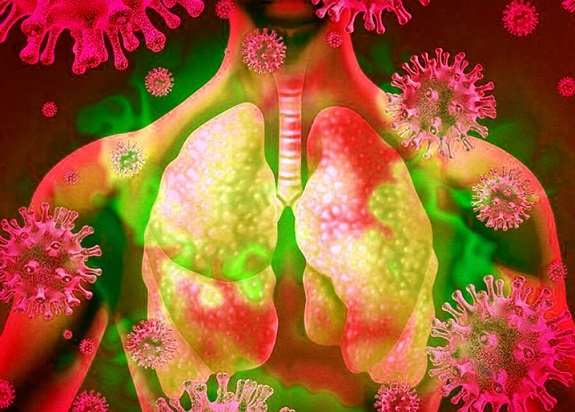French and Italian Researchers Unveil the Role of Caspase-1 in COVID-19-Associated Lung Injury
Nikhil Prasad Fact checked by:Thailand Medical News Team Jan 17, 2025 3 months, 1 week, 2 days, 7 hours, 46 minutes ago
Medical News: In a groundbreaking study, researchers from Aix-Marseille Université, INSERM, and INRAE in France, along with the “G. d’Annunzio” University of Chieti-Pescara in Italy, have delved deep into the biological mechanisms underlying severe COVID-19-induced lung damage. The study focused on the activation of Caspase-1, an enzyme intricately linked to inflammatory processes and tissue damage in COVID-19-associated acute respiratory distress syndrome (C-ARDS). This
Medical News Report unpacks the study findings for a broader audience, highlighting how these discoveries might shape the future of COVID-19 treatment.
 French and Italian Researchers Unveil the Role of Caspase-1 in COVID-19-Associated Lung Injury
Understanding C-ARDS and Caspase-1 Activation
French and Italian Researchers Unveil the Role of Caspase-1 in COVID-19-Associated Lung Injury
Understanding C-ARDS and Caspase-1 Activation
COVID-19 has caused widespread respiratory complications, with severe cases often progressing to acute respiratory distress syndrome (ARDS). While scientists have long recognized the importance of the immune response in combating the SARS-CoV-2 virus, excessive immune activation can lead to severe lung damage, a hallmark of C-ARDS.
The study examined the activation of Caspase-1 and its associated pathways using post-mortem lung samples, bronchoalveolar lavage fluids (BALF), and serum from patients at varying stages of COVID-19 severity. Caspase-1, part of the inflammasome complex, is a critical enzyme in the immune response, promoting the release of pro-inflammatory cytokines like IL-1β and IL-18. The research team hypothesized that excessive Caspase-1 activation contributes to lung injury and vascular damage observed in severe COVID-19 cases.
Key Findings on Cytokine Profiles and Lung Inflammation
Researchers found that Caspase-1 activation and a distinct inflammatory cytokine profile were significantly more pronounced in the lungs of C-ARDS patients than in non-COVID-related ARDS cases. Notably, diffuse alveolar damage, vascular lesions, and the presence of inflammatory cytokines such as IL-1β and IL-6 were consistently observed in lung biopsies.
The study revealed that:
-Caspase-1 was prominently activated in lung tissue, especially in macrophages and areas with vascular injury.
-Inflammatory cytokines IL-1β and IL-6 were highly elevated in bronchoalveolar fluids of C-ARDS patients.
-Circulating IL-6 levels were directly correlated with disease severity, suggesting its potential as a biomarker for identifying high-risk COVID-19 patients.
-Other cytokines, including IL-18 and IFNγ, were elevated, indicating broader inflammatory processes that extend beyond the lungs.
These findings emphasize the role of Caspase-1 in perpetuating a hyper-inflammatory environment, contributing to severe lung injury and vascular complications.
Steroid Treatment and Limitations
Interestingly, the study also evaluated t
he effects of steroid treatments, which are standard for severe COVID-19 cases. Although steroids are known to reduce inflammation by suppressing certain cytokine pathways, their impact on Caspase-1 and related inflammasome activity appeared limited. This observation highlights the need for alternative therapeutic strategies targeting the inflammasome directly.
Conclusions and Future Directions
The findings underscore the critical role of Caspase-1 in the pathogenesis of C-ARDS, with implications for both understanding and treating severe COVID-19. By identifying the persistent activation of inflammatory pathways, particularly in steroid-resistant cases, this research paves the way for exploring new therapies. Potential avenues include targeted inhibitors of Caspase-1, IL-1β, or other components of the inflammasome.
In conclusion, this study provides valuable insights into the inflammatory mechanisms driving severe COVID-19. Addressing the role of Caspase-1 in lung damage could revolutionize treatment strategies, offering hope for improved outcomes in critically ill patients.
The study findings were published in the peer-reviewed journal: Frontiers in Immunology.
https://www.frontiersin.org/journals/immunology/articles/10.3389/fimmu.2024.1493306/full
For the latest COVID-19 News, keep on logging to Thailand
Medical News.
Read Also:
https://www.thailandmedical.news/news/columbia-study-reveals-that-ferroptosis-plays-a-key-role-in-covid-19-pulmonary-disease
https://www.thailandmedical.news/news/covid-19-news-pittsburg-study-shows-that-sars-cov-2-orf7b-protein-induces-lung-injury-via-c-myc-mediated-apoptosis-and-ferroptosis
https://www.thailandmedical.news/articles/coronavirus
